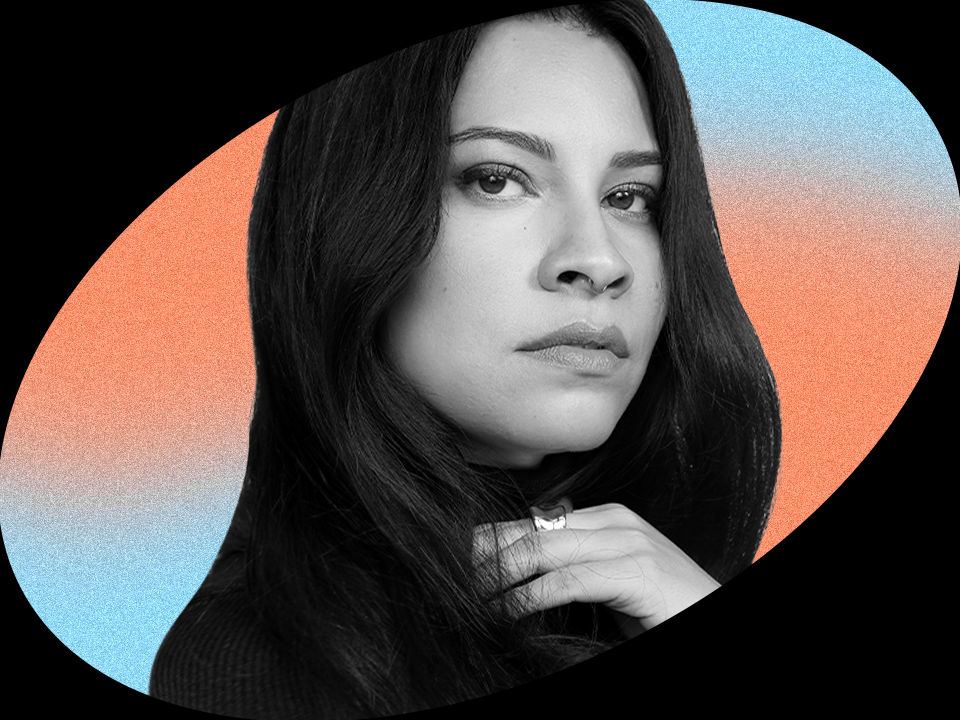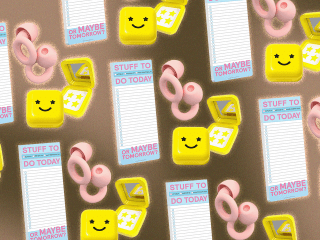Cara Jade Myers Is Speaking Up
“I want to be more open about it and about my journey because it's not anything to be ashamed of.”
We proudly stand with the WGA and SAG-AFTRA. As such, this interview does not focus on the promotion of any particular project.
Poised for a career breakthrough and already being praised as Hollywood’s next star, Cara Jade Myers is staying mindful of her mental health—especially her anxiety—as she celebrates how far she’s come and what might lie ahead. One thing’s for sure, though: That future includes continuing to raise awareness about the importance of mental health and life-saving resources like the 988 crisis line.
“I have so many friends that also have mental health [challenges] that are very open about it. Because they were so open about it, I felt I could be open about it. It's about not keeping it to yourself because you don't know who you're helping by talking,” she tells Wondermind.
Here, Myers gives a glimpse inside her mind, from managing diagnoses like ADHD and anxiety to learning new coping strategies after trauma.
[Sign up here to never miss these candid conversations delivered straight to your inbox.]
WM: What’s invigorating you right now?
Cara Jade Myers: I've been writing a lot more lately, but I've been writing for a few years. I have a few scripts, and I love it because I can still tell stories without having to have a big production. It's just me and my computer, and I can just let the thoughts flow.
WM: Are you also into journaling?
CJM: I tried to get into it, but I have ADHD, so it's so hard for me to stick to routines sometimes. I bought that journal where it's a sentence for five years every day, and I think I did three days and then I have no idea where the book is.
WM: What has your experience with ADHD been like? How did you come to be diagnosed with it?
CJM: Well, I started therapy because I noticed my mental health… Well, actually, it was my husband. He was like, “OK, your mental health. You're not yourself. You're more stressed out, you're more emotional, you're crying.” He didn't say it in a mean way. He was very loving, and we've been together for 21 years, so he knows me. It took me a while to be like, “No, I agree.” Not too long, but probably about six months. And then I was like, “No, I definitely need help.”
So I went to therapy, and she diagnosed me with anxiety, depression, and ADHD. The ADHD [diagnosis] really made sense because I have a terrible memory, which is terrible for an actor. ... And then right now, I'll be thinking of something to say, and then I'll forget mid-sentence and I'm like, “Uhhhh.”
WM: Have you learned anything through therapy that has helped you manage your ADHD or other aspects of your mental health?
CJM: Honestly, I think just knowing about the diagnosis was half the battle because then I can do research. And they give me tips [like], “OK, if you're feeling this way, do this. Or if you're feeling this way, do this.” And I even told them, “I'm in the entertainment industry. I love acting, and I love writing.” So a lot of it was like, “Well write. Get those feelings out.”
WM: How else do you take care of your mental health on a regular basis?
CJM: I like to read [YA, paranormal, and vampire love stories]. It gets me out of my head so I'm able to just focus on something. So reading's a big one. I have a puppy and so I love taking him on walks just to get out of the house and get away from things that are stressing me out. And he's just so adorable that you look at his little face and you're just in a better mood.
WM: When you reflect on your mental health journey, do any time periods or moments stand out to you?
CJM: I was raised in an abusive household. ... So I think as a kid, you're always in survival mode, and I didn't realize that until I was out of the house and in a safe environment.
I think [taking care of my health is] helping me understand what being in survival mode means and how to react to things. There’s so many things I didn't learn how to cope with or learn to emotionally, physically manage my emotions. And so I think, through therapy and getting to know myself and understanding the diagnosis, that it's easier for me to be like, OK, am I doing this because I am going back to that survival mode? I can kind of process it and break it down.
WM: Sometimes when trauma or abuse comes up, there are conversations around inner child work or complex PTSD, for example. Do any of those ideas resonate with you?
CJM: Yeah, I was also diagnosed with PTSD. It's one of those things that you don't realize. As an adult, I'll notice that if my husband's on the phone and he's talking to a telemarketer and he is getting mad at them and kind of raising his voice, all of a sudden, I have to leave. It's this weird response. I didn’t realize until I started talking about it in therapy that if there's conflict of any kind anywhere around me, all of a sudden my body goes into this tenseness and I need to get away.
WM: Since talking to someone and getting the language for what you experienced, have you noticed an improvement in your relationships with other people?
CJM: Yeah, definitely. … And I am an only child, so I basically feel like I raised myself at points. So I think it's definitely helped me because I'm such an isolated person sometimes that it's like, OK, no. Go out. Talk to people. Have fun. You enjoy that stuff. And I'm like, Yes, I do.
It definitely helps with relationships too, because then if I know I'm in a situation where I'm getting overwhelmed, it's not something where it's just like I don't know what's happening. It's like, OK, I know I'm getting overwhelmed, so I can tell the person, “Hey, I need a minute. I'm overwhelmed. I'm going to go sit in my car or something.” And a lot of my friends also experience mental health, so they’re like, “Completely get it. Do what you need to do.”
WM: What’s something you’ve improved about your mental health over the years?
CJM: I think recognizing signs of things. I used to have a lot of panic attacks, and it's because I didn't recognize when I was getting to that point. [It helps to recognize when] I am very much overwhelmed. I can feel my breathing changing, so it's like, What do I need to do? I had a panic attack on a highway, and I'm like, I can feel it coming on. I need to pull over immediately.
It has helped so much to know the signs of it and know yourself. Honestly, before when I didn't know what was happening, it was just all over the place and I felt very all over the place.
WM: When you do notice them coming on, what helps you in the moment?
CJM: I'll usually go to my room and just turn off all the lights and lay down and put on some calming music and just sit there and think through: What is happening? Why am I thinking this? Is this accurate? Is this something I should be reacting to this way, or am I blowing it out of proportion?
Usually after about 10 minutes of me trying to calm myself, my husband will come and help, and then he'll talk to me through it. It really helps having someone to talk to, and he knows I need a minute to just decompress because of the sensory overload. He [goes], “OK, go decompress, and when you're ready for me, text me.”
WM: That’s great you have that support. And it must've been so scary to have a panic attack on a highway too.
CJM: Yeah, I pulled over and called my husband because he's the one I talked to. He was like, “Just stay there. I'm going to come pick you up. We'll get the car tomorrow.” So he literally drove down and picked me up and took me home.
WM: What stigmas or misconceptions about mental health tend to bug you the most?
CJM: In the Native community, it's very much like you don't talk about it. I mean, it's that way all over the place, but I feel like in the Native community, it's very much like we don't talk about it. [But] if you don't talk about it, you can't help people. So when I talk to people, I'm very open like, “Hey, I do therapy. I'm on medication. I have my bad days. I have good days.” I want to be more open about it and about my journey because it's not anything to be ashamed of. I would rather be on medication and be helpful than be in a situation where maybe I'm suicidal or maybe I'm going down a dark path or I'm pushing people away.
WM: Do you have a favorite piece of mental health advice?
CJM: [It’s the idea of] are you going to continue down this path and do nothing to where nothing changes, or are you going to actually start making the changes that you need to be where you want to be?
That motivates me because a lot of times you get paralysis when you are anxious or depressed or something like that. So it's good for me to think to myself and be like, OK, if I don't change something, it'll always be like this. Why am I feeling this way? Why is this happening? … And if I don't know the answer, I don't know the answer. But if I can pinpoint one little thing that I can maybe change, then maybe the next time I can pinpoint something else and then something else to where it's constantly evolving. It's constantly a journey, and I'm constantly learning.
This interview has been edited and condensed for length and clarity.
Wondermind does not provide medical advice, diagnosis, or treatment. Any information published on this website or by this brand is not intended as a replacement for medical advice. Always consult a qualified health or mental health professional with any questions or concerns about your mental health.




